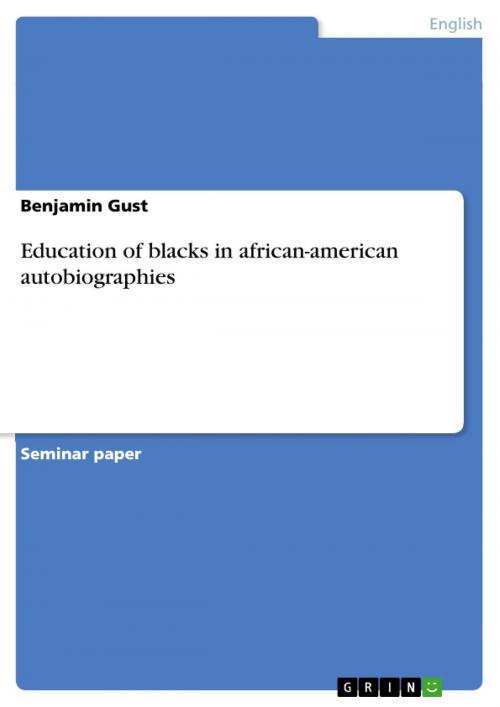Education of blacks in african-american autobiographies
Nonfiction, Entertainment, Drama, Anthologies| Author: | Benjamin Gust | ISBN: | 9783638817356 |
| Publisher: | GRIN Publishing | Publication: | June 24, 2007 |
| Imprint: | GRIN Publishing | Language: | English |
| Author: | Benjamin Gust |
| ISBN: | 9783638817356 |
| Publisher: | GRIN Publishing |
| Publication: | June 24, 2007 |
| Imprint: | GRIN Publishing |
| Language: | English |
Seminar paper from the year 2005 in the subject American Studies - Literature, University of Hannover, 4 entries in the bibliography, language: English, abstract: When reading African-American autobiography one is likely to notices that there are several recurring themes. One might conclude that these are issues of special interest to the authors. A major topic that occurs in a number of autobiographies is that of education. This paper will try to analyze the role of education in the process of the emancipation of the black race. Before one looks at what can be found about the issue of education of blacks in African-American autobiography one should be familiar with the historical and cultural context in which it occurs. This is why the paper will try to provide a brief historical overview of the development of education in America at the times before, during and after the civil war. After having established the historical background the paper will try to trace the occurrences of the theme of education in the autobiography of Booker T. Washington and the thesis The Talented Tenth by W.E.B. Du Bois and illustrate its importance to the authors. In doing so an attempt will be made to present the reasons and intentions of the authors that made them deal with education during their lives. Special attention will be paid to the efforts of Booker T. Washington to establish a schooling system for blacks as well as to Du Bois' concept of the 'Talented Tenth' and its reasons. Although both were actively sought to improve the education of African Americans and thereby their social status they did not share the same concepts of how this were to be achieved and they pursued different educational policies. The two approaches will be analyzed and compared to each other. Finally a conclusion will be drawn assessing the importance of their achievements in the ongoing fight of African Americans for equal rights and equal chances.
Seminar paper from the year 2005 in the subject American Studies - Literature, University of Hannover, 4 entries in the bibliography, language: English, abstract: When reading African-American autobiography one is likely to notices that there are several recurring themes. One might conclude that these are issues of special interest to the authors. A major topic that occurs in a number of autobiographies is that of education. This paper will try to analyze the role of education in the process of the emancipation of the black race. Before one looks at what can be found about the issue of education of blacks in African-American autobiography one should be familiar with the historical and cultural context in which it occurs. This is why the paper will try to provide a brief historical overview of the development of education in America at the times before, during and after the civil war. After having established the historical background the paper will try to trace the occurrences of the theme of education in the autobiography of Booker T. Washington and the thesis The Talented Tenth by W.E.B. Du Bois and illustrate its importance to the authors. In doing so an attempt will be made to present the reasons and intentions of the authors that made them deal with education during their lives. Special attention will be paid to the efforts of Booker T. Washington to establish a schooling system for blacks as well as to Du Bois' concept of the 'Talented Tenth' and its reasons. Although both were actively sought to improve the education of African Americans and thereby their social status they did not share the same concepts of how this were to be achieved and they pursued different educational policies. The two approaches will be analyzed and compared to each other. Finally a conclusion will be drawn assessing the importance of their achievements in the ongoing fight of African Americans for equal rights and equal chances.















